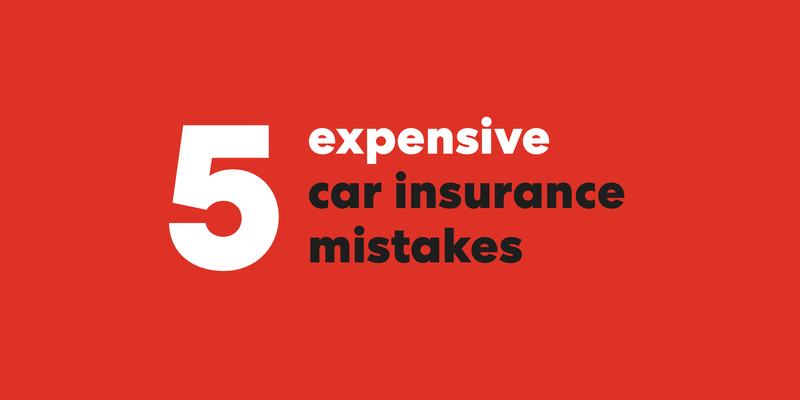
If you are not redirected within 30 seconds, please click here to continue.
Samedi: 10h – 16h HAE

If you are not redirected within 30 seconds, please click here to continue.
If you are not redirected within 30 seconds, please click here to continue.
5 expensive car insurance mistakes

Table of Contents
- Having a major conviction like texting while driving can result in a 70% increase in your annual car insurance premium.
- Missing payments on your auto insurance policy is one of the most overlooked mistakes and can lead to a 36% increase in your annual premium with the next company.
- Having your auto insurance policy cancelled for misrepresentation can result in a 22% increase in your annual premium when you try to find insurance elsewhere.
Using your phone to shoot off a quick text while driving might seem harmless, but apart from being a major conviction and an expensive traffic ticket, distracted driving can also result in a higher insurance premium and affect your eligibility when it comes to getting a policy with a new insurance provider.
Likewise, failing to report a seemingly trivial change in the usage of your vehicle can increase your premium, as can lying about where you live.
To find out what these and other car insurance mistakes can cost you, we used the RATESDOTCA auto insurance quoter to compare the lowest annual quoted premium for a hypothetical 35-year-old male driver living in downtown Toronto.
Here’s what we found:
Mistake #1: texting while driving
This mistake will cost you big, not just in terms of the fine you’ll receive from police, but the surcharge you’ll face when you go to either renew your policy or find insurance elsewhere.
Our hypothetical driver saw his $2,592 annual quoted rate (for a clean driving record) increase to $4,406 after receiving a “prohibited use of hand-held device while driving” ticket – a 70% increase.
“Most insurance companies do not permit drivers to have even one major conviction like distracted driving,” says Kelsey Hawke, RATESDOTCA auto insurance expert.
“Automatically, [this conviction] would force you to a higher-risk market where you would pay a higher premium for the same coverage,” she adds.
High-risk drivers can still obtain auto insurance, but it will cost them significantly more, which is why comparing auto insurance rates and maintaining a safe driving record is so important.
Mistake #2: not paying your premium
“This is one of the most overlooked mistakes,” says Hawke. “People look at this like they’d look at a cellphone deal, but it is very impactful.”
According to the RATESDOTCA quoter, there was a 36% increase in the lowest quoted premium due to a cancellation for non-payment, jumping from $2,592 to $3,526.
While your insurance company may allow for two missed payments, says Hawke, the second one could result in outright cancellation of your policy, and there is no option to reinstate your policy.
“Even if you make the payment up within its specified period – it still counts as a missed payment on your record,” says Hawke.
Drivers should also be aware that not all insurance companies will insure them with a non-payment on their record, and those that do will heavily surcharge the policy.
“Non-payment of insurance stays on your insurance record for three years,” says Hawke, “and [impacts your] eligibility when you are trying to get insurance with another company.”
Mistake #3: material misrepresentation
Lying to your insurance provider about where you live, who drives your car, or what you use the vehicle for can all lead to your policy being cancelled. Additionally, these actions may lower your eligibility options with other insurance providers and lead to a higher premium.
Our quoter reveals that if an insurance provider has cancelled your policy because of material representation, you could see an increase in your premium of up to 22% with a new company. Our hypothetical driver’s clean record annual quoted rate of $2,592 jumped to $3,167 after a policy cancellation due to material representation.

Mistake #4: not bundling your home/renter's insurance with your car insurance provider
There are multiple benefits to combining your home and car insurance policy with the same provider. For one, when you bundle policies, not only does the auto policy get discounted, but so does your home insurance policy.
Depending on the insurance company, you can save anywhere between 5-15% when you bundle your home and car insurance policies. And to make sure you’re not missing out on additional savings, you can compare bundled home and auto insurance quotes for the most affordable policy.
Using the RATESDOTCA auto insurance quoter, we saw a 10% decrease in the annual quoted rate when the driver opted into the bundling discount.
Mistake #5: not putting winter tires on your vehicle
The Tire and Rubber Association of Canada’s 2021 study found that 79% of Canadian winter tire owners believe winter tires have prevented them from being involved in a collision or other dangerous situation.
“[Winter tires] can prevent the likelihood of a single-vehicle accident,” Hawke says. “Single-vehicle accidents are considered at-fault accidents, regardless of you sliding on ice or hitting a pole. If no one is involved, that would still impact your premium.”
Apart from the safety that winter tires provide, another incentive is that most insurance companies provide up to a 5% discount for having winter tires. In fact, in Ontario, providers are obligated to do so.
Not opting for winter tires may lead to a higher premium simply because you’re not taking advantage of this discount and therefore leaving money on the table. Sure enough, our hypothetical driver’s lowest quoted rate increased by 5% (from $2,592 to $2,729) when he said no to winter tires.
While these are the auto insurance mistakes we examined using our auto insurance quoter, there are several others that can impact your premium.
Other mistakes that can cost you when it comes to auto insurance
Not reporting a fender-bender
If you don’t report a minor collision to your insurance company, the other party may report it, regardless. If you are deemed at-fault, it will remain on your driving record for up to six years and will increase your insurance rate.
Moreover, if you have existing vehicle damage that you’ve not repaired, it could limit your claim settlement the next time you are involved in an accident.
Purchasing collision for an older used car
As your vehicle gets older, it may not be worth it to opt for comprehensive coverage (fire, theft, vandalism, loss, breakage, or collision coverage). For instance, if your deductible is $1,000 and you get in an accident, the actual cash value of the vehicle at the time of the claim may be less than, or little above, your deductible amount.
While there are additional considerations, it is important to speak with your broker to determine what your options might be to reduce cost on an older vehicle.
Cancelling insurance for seasonal use vehicles
The premium on seasonal use vehicles is calculated based on their seasonal use, even though you pay an annual premium for the vehicle. “The insurance company just divides the premium over 12 months to help with the cost, but it doesn’t actually save the consumer any money to cancel off-season,” Hawke explains.
“If you decide to cancel the policy upon spring on a snowmobile, for instance, not only have you already been charged the seasonal premium, but you may also be charged a cancellation fee to cancel the policy mid-term.”
Not adding occasional or newly licensed drivers in the household to your policy
If you have a newly licensed child and they are not listed on your policy, this counts as misrepresentation. If they’re involved in an accident, the insurance company may not pay your claim.
Secondly, for young drivers to bring down their insurance premium, they need to gain insurance history. If you don’t list your children or newly licensed drivers on your policy, you’re making it harder for them to obtain a lower rate when they get their own policy.
Similarly, if you are regularly lending your vehicle to a friend (who doesn’t have their own insurance policy), that can be deemed “misrepresentation of risk.” If that person is involved in an accident in your vehicle and the insurance company was unaware that they often drive it, they may decline to cover the costs of the damage and any potential liability exposure.
Methodology
Parameters used for driver quotes:
- 35-year-old male living in downtown Toronto
- Single and employed
- G licence, driving a 2021 financed four-door Honda Civic LX purchased this year
- Uses car for personal use
- Drives five kilometres daily to and from work (10,000 kilometres annually)
- Parks in a private driveway
- Yes to winter tires (except when demonstrating the lack of discount for saying no)
- Insured consistently since 2003, and with his current insurance company for two years
- Comprehensive and collision coverage
- No policy cancellations, no time without insurance coverage, and a clean driving record (except when demonstrating cancellation surcharge for misrepresentation and non-payment)
- No discounts selected for UBI, bundling (except when demonstrating the bundle discount), CAA, or soft credit check
Interested in creating content with RATESDOTCA? Reach us at email@rates.ca.
Don't waste time calling around for auto insurance
Use RATESDOTCA to shop around, and compare multiple quotes at the same time.
Get money-saving tips in your inbox.
Stay on top of personal finance tips from our money experts!









